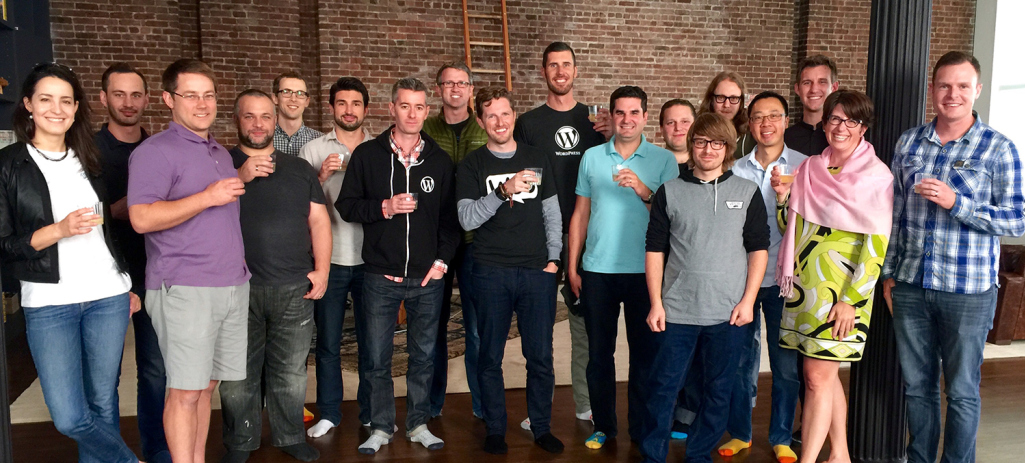
Automattic CEO Matt Mullenweg announced today that the company has acquired WooCommerce, WordPress’ most popular e-commerce platform. The plugin recently passed seven million downloads and stats from BuiltWith show that WooCommerce is dominating global e-commerce platforms, powering roughly 30% of all online stores.
This is Automattic’s largest acquisition to date, bringing 55 new employees into the company from 16 countries for a total of 370 Automatticians. Mullenweg confirmed that the acquisition includes Woo, Sensei, and all of the other plugins and themes.
Given WooCommere’s extensive adoption on the web, Automattic will not be re-branding the newly acquired products. WooThemes and WooCommerce will continue to be sold via their dedicated websites.
“We’re planning on retaining (and growing) the WooCommerce brand,” Mullenweg told the Tavern. “The plan is to keep what has been working going.”
Mullenweg has spoken frequently over the years about growing Automattic’s reach into global commerce, but few could have predicted that the company would acquire Woo as opposed to building its own in-house commerce platform.
“They have a full team that goes to bed every night and wakes up in the morning thinking about commerce; it’s core to their DNA,” Mullenweg said. “That’s better than starting it in-house. Also they have a ton of adoption already.”
In April, WooThemes co-founder Magnus Jepson told the Tavern that WooCommerce accounts for over 85% of overall sales and processes “several million dollars per year.” Jepson also confirmed that WooCommerce’s revenue “has been climbing steadily over the past few years, and we are regularly breaking monthly revenue records.”
Automattic is not releasing the financial details of the acquisition, but Re/code speculates that it was in the range of $30 million:
Sources say Automattic will spend more than $30 million in cash and stock to buy the 55-person company. Automattic CEO Matt Mullenweg wouldn’t comment on the price but said the acquisition was the largest his company had made, ‘by about 6x.’
In addition to growing the current WooCommerce customer base, Automattic is looking to use the platform to add more selling options for WordPress.com customers, while retaining its existing e-commerce partnerships.
“Partnerships will remain in place on WP.com, but long-term we’d like to offer Woo as an option there as well,” Mullenweg said.
When asked about plans to integrate WooCommerce into Jetpack, he said, “Jetpack could definitely complement WooCommerce (and WooThemes), but not the other way around.”
WooThemes founders never imagined that WooCommerce would rise to the level of popularity that it has, ultimately bringing them into the Automattic family. Co-founder Mark Forrester writes:
In 2008, as three strangers in three countries, we set out on a quest to pioneer WordPress commercial theming, never dreaming of the rocket-propelled voyage into the self-hosted eCommerce unknown that lay ahead. It’s been an incredible ride, backed by a unique community, and here we find ourselves powering over 24% of online stores with our flagship product, WooCommerce.
The acquisition affects a whole fleet of third-party designers and developers who create products for WooCommerce. They will likely have more opportunities and sales ahead of them with the power of Automattic behind the core plugin. Mullenweg confirmed that the next WooConf, scheduled to take place in Austin in November, will continue on as planned. Those who are heavily involved in the WooCommerce ecosystem will still be able to connect and build for the platform as they have done previously.
Democratizing Selling with WooCommerce
With Automttic now at the helm of the most dominant e-commerce platform on the web, it will be interesting to see if the company can make selling online just as simple as it has made publishing online. WordPress.com’s tremendous success can be partially attributed to the company’s commitment to democratizing publishing.
“I do believe that the web needs an open, independent and easy-to-use commerce platform that you can run yourself on your own website,” Mullenweg said in his video announcement, the first video ever to be published to Automattic’s YoutTube account.
Publishing products and selling them on the web is arguably a more complex endeavor than simple publishing, especially when you factor in location, tax, payment gateways, and everything needed to process transactions. The average non-developer has no concept of what it takes to set up a blog, let alone an online store. But if Automattic can play a part in democratizing the ability for regular folks to sell products online, it has the potential to globally transform e-commerce.
Source: WP Tavern







